
Table of contents
- 1.15 Tips for Managing Employees Effectively
- 2.Set clear goals
- 3.Measure performance regularly
- 4.Communicate openly
- 5.Encourage employee input
- 6.Reward hard work
- 7.Delegate effectively
- 8.Encourage learning
- 9.Create a Collaborative Work Environment
- 10.Manage your managers
- 11.Use one-on-ones strategically
- 12.Don't take performance personally
- 13.Hire great people
- 14.Promote employee well-being
- 15.Get to know your people
- 16.Understand your employees’ needs
- 17.Managing employees for success
Much has changed over the past few years in the world of business management, but one thing remains clear: effective employee management stands as the linchpin for any business’s organizational success. It is the foundation of cultivating a positive work environment, raising employee engagement, and steering the company toward success.
Everyone’s management style is different, but there are some core attributes needed for effective leadership:
- Understanding of the work.
- Knowledge of the company and its policies.
- Effective communication skills.
- The ability to establish clear expectations.
Even with those in hand, you could update your management skills. The tips presented in this article make up a comprehensive guide for managing employees.
15 Tips for Managing Employees Effectively
1. Set clear goals
Great managers lead. Clear and measurable goals let everyone know what to focus on. It helps employees align their efforts with the organization’s objectives. They know what success looks like. Managers should communicate the goals, explain how they can be reached, and use the goals as a basis for feedback. Identifying specific goals helps people work in a unified direction that enhances employee productivity and boosts everyone’s chances for success.
Try this: Put goals in writing. Depending on your workplace, that could be on a shared website or a poster that's hung in a prominent place.
2. Measure performance regularly
Employees like to know where they stand. Continuous feedback is a key element of effective performance management. Having a regular cadence where managers can provide constructive feedback, recognize achievements, and address areas for improvement is a key component to effective performance management. Good managers set up a process for measuring performance, they don't wing it. Measuring performance helps managers judge employees by their work, not their personalities. A fair process for measuring performance can improve employee performance, help you groom new leaders, and contribute to the overall growth of your team.
Try this: Schedule regular check-ins to review performance. Don't wait until a bad situation gets out of hand or a great employee leaves because they were uncertain about how they were doing.
3. Communicate openly
Open communication fosters a positive work environment where employees feel heard, valued, and validated. Establishing policies and procedures that encourage transparent communication creates a culture where ideas flow freely, and problem-solving becomes a collaborative effort. A manager doesn't have to be glib to manage employees. Being straightforward and willing to share information works just fine.
Try this: If you think you aren't a "great talker," be a diligent one. Schedule times to check in with people.
4. Encourage employee input
Valuing and encouraging diverse perspectives contributes to a vibrant and innovative work environment. Managers should actively seek input from their teams, creating platforms for employees to share their opinions, ideas, and concerns. This inclusivity fosters a sense of ownership and engagement among employees.
Try this: Measure yourself on how often you seek input from employees. Think about how you react to it.
5. Reward hard work
Recognizing and rewarding hard work goes beyond monetary incentives. Acknowledging achievements publicly, providing opportunities for professional development, and fostering a culture of appreciation motivates employees to invest in the success of the organization.
Try this: When an employee does something outstanding, send a handwritten note to thank them. It makes a lasting impression.
6. Delegate effectively
Delegating tasks empowers employees and can help them develop new skills. The ability to delegate tasks wisely can help you achieve team goals while providing growth opportunities for individual team members.
Try this: Don't delegate and disappear. Check in regularly to monitor progress and offer help. You can be supportive without hovering.
7. Encourage learning
Investing in development through training initiatives and mentorship programs contributes to employee success. This can help retain valuable employees. A commitment to perpetual learning not only enhances individual skills but also strengthens the overall capabilities of the team.
Try this: If your company lacks the resources for a training program, start an informal one by asking each employee to recommend an online video or magazine article to read and discuss.
8. Create a Collaborative Work Environment
Effective leaders recognize the value of learning from their team members. Creating a culture where feedback flows in all directions cultivates a collaborative and innovative work environment. Your employees will be more encouraged to work together instead of keeping to themselves.
Try this: Make a list of your direct reports and ask what you have learned and could learn from each of them.
9. Manage your managers
Senior management and leadership positions require robust management skills. Give your middle managers ongoing support, guidance, and opportunities for skill development. It’s an investment in the company’s future (by developing leaders) and in your current success (by improving the management of your teams).
Try this: Consider the programs that TriNet offers for leadership training. We’ll help you prepare your leaders with the skills they need to push your business to the next level. Workshops are conducted in an intimate setting for in-depth discussion between moderator and participant.
10. Use one-on-ones strategically
Take your one-on-one meetings beyond project updates. Use them as opportunities for strategic problem-solving and personal growth discussions. It makes employees feel heard and supported in their career trajectories. Using these meetings to share positive feedback can boost morale and help employees feel like an important part of the team. They can also help employees continue to focus on objectives that matter most and redirect their focus if necessary.
Try this: If you regularly hold one-on-one meetings with employees, good job! Go the extra mile by creating an agenda for each meeting to support your strategy.
11. Don't take performance personally
Separating personal feelings from performance evaluations is essential for objective management. Constructive feedback should focus on areas for improvement and growth rather than being influenced by personal biases.
Try this: The use of clear goals and regular reviews allows managers to frame things in terms of those well-understood, agreed-upon and objective parameters.
12. Hire great people
The hiring process should serve as the first building block of a strong team. Managers should be actively involved in the hiring process, ensuring that they bring in new employees who possess the necessary skills and will add to the company culture.
Try this: During interviews, ask questions about specific times that the applicant handled situations that the new job would entail. Get help by outsourcing your hiring process to gain access to tools like applicant tracking systems to automate everything from posting job ads to comprehensive vetting.
13. Promote employee well-being
Employee well-being is integral to long-term success. Implementing wellness programs, addressing work-life balance, and educating on mental health awareness can help contribute to a healthy and engaged workforce.
Try this: Make sure to remind employees that they should take advantage of these benefits.
14. Get to know your people
Building relationships with team members on a personal level fosters a supportive work environment. Managers should take the time to understand the strengths, aspirations, and challenges of each employee, creating a foundation for effective leadership and mentorship. Getting to know your employees will nurture a stronger team bond and help you flex your emotional intelligence muscles.
Try this: Use a team-building or ice-breaking game during a team meeting to learn about individuals' competitiveness, problem-solving skills, likes and dislikes.
15. Understand your employees’ needs
This complements No. 14. There’s no better way to make sure the employee experience is a positive one than taking the time to understand the needs of your workforce. This could mean making sure they have the equipment they need to thrive. It could mean getting them extra training. It could mean pushing them a bit beyond their comfort zone so they can grow. Paying attention to people as individuals is a powerful leadership tool.
Try this: Add an agenda item for your one-on-one meetings that asks employees to name things that are blocking them from reaching their goals.
Managing employees for success
Effective employee management is the heartbeat of organizational success. TriNet can help you as your strategic consultant, offering comprehensive HR solutions that cover everything from HR administration to helping you enhance the employee experience. TriNet empowers businesses so businesses can focus on navigating the complexities of managing their workforce with confidence, providing a solid foundation for success.
As a professional employer organization (PEO), TriNet provides leading HR services and tools for things like talent recruitment and onboarding. We can also help you develop effective leadership and build a strong team through our talent retention and growth services. These tools can help you lead employees to success.
This communication is for informational purposes only, is not legal, tax or accounting advice, and is not an offer to sell, buy or procure insurance.
TriNet Team
Table of contents
- 1.15 Tips for Managing Employees Effectively
- 2.Set clear goals
- 3.Measure performance regularly
- 4.Communicate openly
- 5.Encourage employee input
- 6.Reward hard work
- 7.Delegate effectively
- 8.Encourage learning
- 9.Create a Collaborative Work Environment
- 10.Manage your managers
- 11.Use one-on-ones strategically
- 12.Don't take performance personally
- 13.Hire great people
- 14.Promote employee well-being
- 15.Get to know your people
- 16.Understand your employees’ needs
- 17.Managing employees for success






